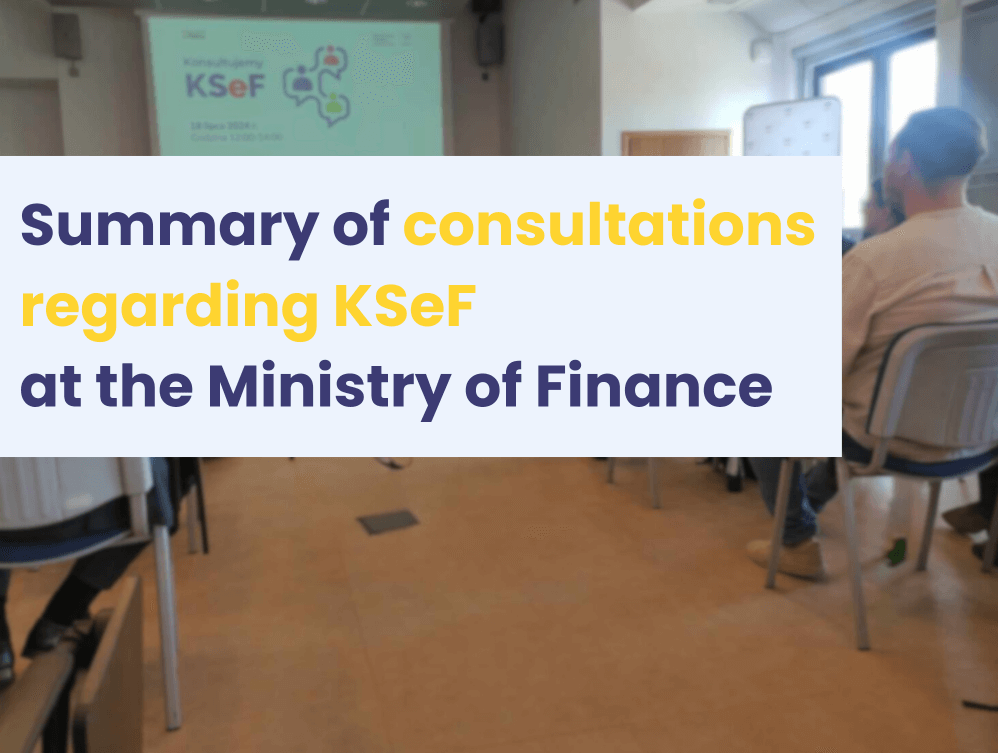Yesterday’s consultations at the Ministry of Finance (MoF) on continuing the implementation of the structured invoice attracted the attention of all interested parties, especially after the mandatory KSeF deadline was postponed to the beginning of 2026. In the maze of intricate regulations and technical nuances lies a vision of a future in which invoicing will become more automated and secure. Among the meeting participants, including a representative of our company, there were both fears and expectations regarding the system’s future.
Key topics of the consultation
During the meeting, the focus was on three thematic blocks:
B2C invoices
- Consumer invoices will remain optional in the KSeF, and the issuer will decide to issue an invoice in the KSeF.
- The Ministry of Finance withdrew from the idea of “self-identification” of the buyer, i.e. an attempt to motivate the buyer to provide their tax ID when shopping.
- The participants put forward a demand to specify unambiguous, simple and effective requirements that will allow the issuer of an invoice to decide whether to issue it in the KSeF or not. Clarifying the criteria is crucial for safely applying the rules and avoiding an excessive burden on taxpayers’ and KSeF’s systems.
Deferral of deadlines, including penalties
- The recently adopted amendment to the VAT Act postponing the mandatory KSeF to 1.2.2026 consequently postponed the related deadlines to 1.8.2026, including the application of penalties for failure to issue an invoice in the KSeF, the obligation to use the KSeF identifier in payments, and the withdrawal of invoices from fiscal devices.
- The implementation phase aims to obtain the “start-up” period of the KSeF based on large taxpayers.
- In September, a draft of the new logical structure of FA(3) and legal changes will be published, which will be widely consulted. Changes in the schema are to address the submitted postulates, e.g., due date as text instead of date, better identification of local government units, adding the Employee role to Entity3, increasing the length of the product name field, etc
- The Ministry of Finance also plans to publish a road map of further activities, including the alignment of test/demo/prod environments.
- The specifications for the invoice attachment will also be published. Still, it will only be an additional document related to the invoice, allowing you to provide tax, business data, etc., without the possibility of sending a file, np. pdf.
- Technical changes, e.g. certificates for generating QR, will be published well in advance.
- The final KSeF environment, which will not be subject to modifications, is planned for November 2025, but taxpayers will have plenty of time to test all functionalities.
- The BIP will provide information about the failure of the KSeF, but there will also be a dedicated API for automatically checking the KSeF status. Plus, there is information about planned breaks.
- In the coming months, the Ministry of Finance will launch a dedicated hotline for taxpayers.
Paper invoice
- The Ministry of Finance is inclined to a transitional period, during which the taxpayer could use the offline mode widely, i.e., issue a structured invoice outside the KSeF (with a QR code, etc.) with the obligation to send it to the KSeF on the next business day. This will be optional if the KSeF is not ready to issue invoices in real-time.
- The Ministry of Finance understands that implementing the KSeF may be a technological challenge for micro-entrepreneurs. Hence, the concept of temporary exemption for small entities is being developed to give them more time to adapt to legal obligations. The proposed criterion was the amount of a single invoice (up to PLN 450) and monthly turnover (up to PLN 10K); in the course of the discussion, it was argued that a taxpayer who issues several invoices for a more significant amount should also be exempt from the obligation to issue an invoice in the KSeF – in other words, the number and not the number of invoices should be decisive.
Consultations at the Ministry of Finance on structured invoices in the KSeF brought a lot of important information. On the one hand, it was emphasised that the KSeF project is developing towards the best possible adaptation to the diverse needs of taxpayers. On the other hand, attention was drawn to clarifying the criteria for B2C invoices to avoid an excessive burden on taxpayers’ and KSeF systems. In addition, the planned deadlines and penalties were discussed, and the publication of the new logical structure of FA(3) and legal changes were announced. All this proves the dynamic development of the KSeF project and its importance for the future of e-invoicing in Poland. Our customers can rest assured that we are constantly adapting SmartKsef to the upcoming requirements, actively participating in consultations and staying updated with every change.


